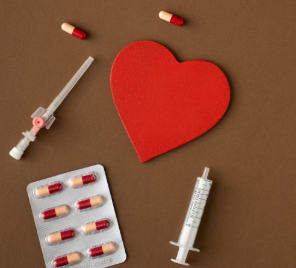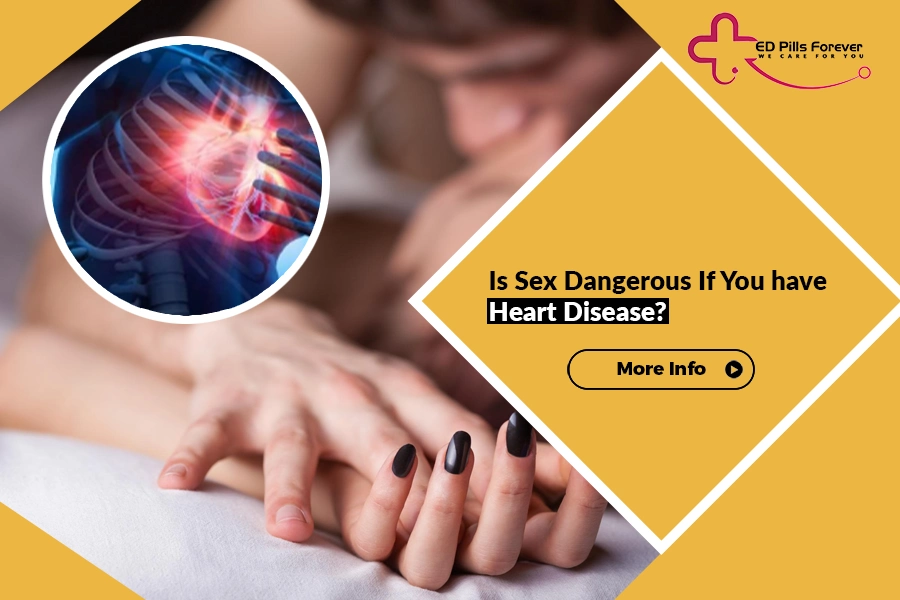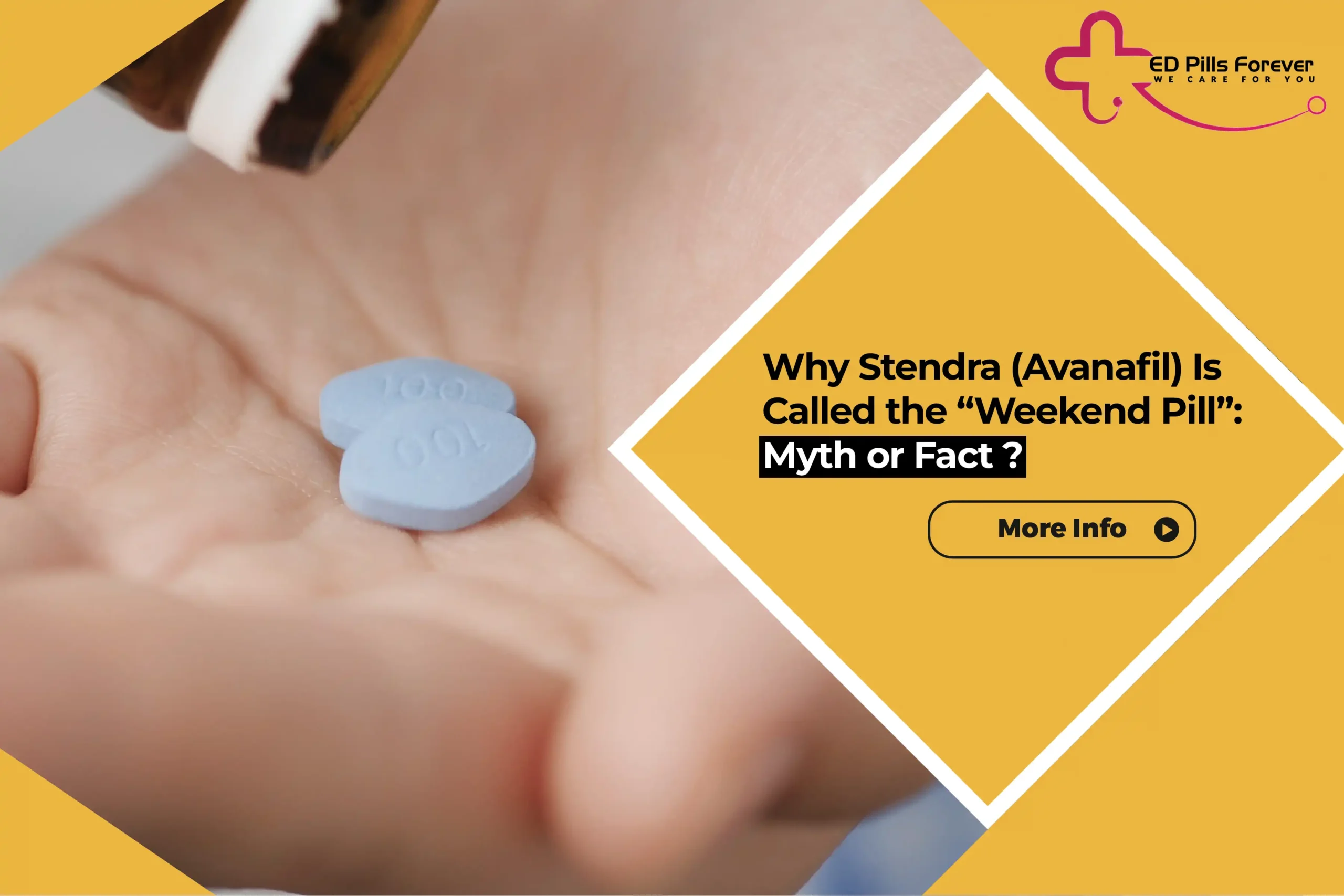Is Sex Dangerous If You Have Heart Disease?
Living with cardiovascular disease shouldn’t mean giving up on intimacy. Yet research reveals that nearly 60% of heart disease patients significantly reduce or completely avoid sexual activity after their diagnosis, often out of fear rather than medical necessity. This widespread retreat from intimate relationships stems from a common but crucial question: Is sex dangerous if you have heart disease?
The anxiety is understandable. When your heart has already shown signs of vulnerability, the physical exertion and emotional intensity of sexual activity can feel like playing with fire. Many cardiac patients worry that the increased heart rate and blood pressure during intercourse might trigger another heart attack or cause dangerous cardiac complications. Partners, too, often share these concerns, leading to relationship strain and decreased quality of life for both individuals.
For men experiencing erectile difficulties alongside heart disease, treatments such as Kamagra Gold 50mg are sometimes considered. However, these medications must always be used with strict medical guidance, especially since interactions with certain heart drugs like nitrates can be risky.
What You’ll Discover in This Guide
This comprehensive guide will address your most pressing concerns about heart disease and sexual health, providing you with evidence based answers from leading cardiovascular specialists. You’ll learn:
- When sexual activity becomes genuinely risky for heart patients and the specific warning signs to recognize
- Safe timelines for resuming intimacy after heart attacks, cardiac surgery, or heart failure episodes
- How heart medications affect sexual function and what you can do about unwanted side effects
- Proven strategies for maintaining intimacy while protecting your cardiovascular health
- The surprising health benefits that sexual activity can provide for cardiac patients
- Professional resources and support available to help you navigate these sensitive conversations
Whether you’re a newly diagnosed cardiac patient, someone recovering from a heart attack, or a partner seeking to understand how to safely maintain physical intimacy, this guide will equip you with the knowledge you need to make informed decisions about your sexual health.
Remember: every heart condition is unique, and your individual circumstances matter. While this information provides general guidance based on current medical research, it should never replace personalized advice from your cardiologist or healthcare team. The goal isn’t to eliminate all risks, it’s to help you understand what those risks truly are so you can make choices that honor both your cardiac health and your need for intimate connection.
The Truth About Sex and Heart Disease Safety
Is Sexual Activity Safe for Heart Disease Patients?
Yes, sexual activity is generally safe for people with stable heart disease. The physical demands of intercourse typically match those of moderate exercise, similar to climbing one to two flights of stairs or walking briskly for 10-15 minutes. Most importantly, cardiac events during sexual activity are exceptionally uncommon, occurring in fewer than 1% of all heart attack cases.

Understanding the Real Risks vs. Perceived Fears
The disconnect between patient fears and actual cardiovascular risks surrounding sexual activity is significant. While many cardiac patients avoid intimacy due to performance anxiety or fear of triggering cardiac complications, the medical reality tells a different story.
Actual Physical Demands of Sexual Activity:
- Heart rate typically increases to 100-130 beats per minute during climax
- Blood pressure rises moderately, similar to light-to-moderate exercise
- Total energy expenditure equals approximately 3-5 METs (metabolic equivalents)
- Average duration of peak exertion lasts only 2-4 minutes
For perspective, these cardiovascular demands are comparable to everyday activities that most heart disease patients perform without concern, such as:
- Taking a shower
- Carrying groceries upstairs
- Playing with grandchildren
- Walking at a moderate pace
- Doing light household chores
What Makes Sexual Activity Different from Other Exercise?
Unlike prolonged physical exercise, sexual activity involves brief periods of increased cardiac workload followed by rapid recovery. This intermittent pattern is generally well-tolerated by hearts that have adapted to stable coronary artery disease or controlled heart failure.
The key factor determining safety isn’t the activity itself, but rather the stability of your underlying heart condition. If your cardiovascular system can handle the equivalent physical exertion during daily activities without symptoms, it can typically handle the demands of intimate relations.
When Heart Disease Makes Sex Genuinely Risky
While sexual activity poses minimal risk for most cardiac patients, certain heart conditions do require caution or temporary abstinence:
High-Risk Scenarios:
- Unstable angina with unpredictable chest pain episodes
- Recent cardiac events (within 2-6 weeks, depending on severity)
- Severe heart failure with symptoms during minimal exertion
- Uncontrolled arrhythmias or dangerous heart rhythm disturbances
- Severe valve disease causing significant cardiac output limitations
The Stability Factor: Your cardiologist evaluates “stability” based on several factors: consistent medication response, absence of worsening symptoms, successful completion of cardiac rehabilitation milestones, and adequate functional capacity during routine activities.
Separating Medical Risk from Psychological Barriers
Many sexual difficulties experienced by cardiovascular disease patients stem from psychological factors rather than physical limitations. Common emotional barriers include:
- Fear of causing another heart attack during intimacy
- Anxiety about partner safety concerns
- Depression following cardiac diagnosis
- Reduced self-confidence after cardiovascular events
- Medication-related sexual dysfunction creating performance concerns
Understanding that these concerns, while valid, often exceed the actual medical risks can be the first step toward reclaiming intimate relationships after a cardiac diagnosis.
The Bottom Line on Heart Disease Sexual Safety
For the majority of cardiac patients with stable conditions, sexual activity represents a normal, healthy part of life that can actually contribute to overall cardiovascular wellness. The benefits of maintaining intimate relationships, including stress reduction, emotional connection, and moderate physical activity, often outweigh the minimal cardiovascular risks involved.
However, individual circumstances vary significantly. Your personal safety depends on factors like your specific heart condition, current medications, fitness level, and overall cardiac stability. This is why professional medical clearance remains essential before resuming sexual activity after any cardiac event or diagnosis.
How Heart Disease Affects Your Sex Life
Heart disease doesn’t just impact your cardiovascular system, it can significantly alter your sexual function and intimate relationships. Understanding these changes is crucial for developing realistic expectations and finding effective solutions. The effects typically fall into two categories: direct physical impacts on sexual function and medication-related side effects that interfere with intimacy.
Physical Effects of Heart Disease on Sexual Function
Erectile Dysfunction and Heart Disease Connection
Erectile dysfunction affects approximately 75% of men with cardiovascular disease, making it one of the most common sexual complications cardiac patients face. This connection isn’t coincidental, both conditions share similar underlying causes.
Why Heart Disease Causes Erectile Problems:
- Reduced blood flow: Atherosclerosis (arterial hardening) that affects heart arteries also impacts penile blood vessels
- Endothelial dysfunction: Damaged blood vessel linings can’t properly dilate to allow adequate blood flow for erections
- Nerve damage: Some cardiac conditions affect the autonomic nervous system that controls erectile function
- Decreased cardiac output: Heart failure can reduce overall circulation, including blood flow to sexual organs
The Vascular Connection: Erectile dysfunction often appears 2-5 years before coronary artery disease symptoms become apparent. This is because penile arteries are smaller than coronary arteries, so circulation problems manifest there first. Many cardiologists now consider erectile dysfunction an early warning sign of cardiovascular disease.
Reduced Libido from Cardiac Medications
Heart disease medications, while life-saving, frequently cause sexual side effects that impact both desire and performance. Understanding which medications affect sexual function can help you work with your healthcare provider to find the best balance between cardiac protection and sexual wellness.
Common Cardiac Medications That Reduce Sex Drive:

Beta-blockers (metoprolol, atenolol, propranolol):
- Reduce heart rate and blood pressure, potentially limiting blood flow to sexual organs
- Can decrease energy levels and overall sexual interest
- May cause fatigue that interferes with intimate activities
Diuretics (furosemide, hydrochlorothiazide):
- Can reduce blood volume, affecting genital blood flow
- May cause electrolyte imbalances that impact sexual function
- Often contribute to erectile dysfunction in men
ACE inhibitors and ARBs (lisinopril, losartan):
- Generally have fewer sexual side effects than other cardiac medications
- Occasionally cause decreased libido or mild erectile problems
- Usually better tolerated than older blood pressure medications
Antidepressants (prescribed for post-cardiac depression):
- SSRIs commonly prescribed after heart attacks can significantly reduce libido
- May delay or prevent orgasm in both men and women
- Can cause emotional numbness that affects intimate connections
Sexual Effects in Women with Heart Disease
Women with cardiovascular disease face unique sexual challenges that are often overlooked in medical discussions focused primarily on male erectile dysfunction.
Vaginal Dryness and Heart Disease:
- Reduced circulation affects vaginal tissue, decreasing natural lubrication
- Heart medications, particularly diuretics, can worsen vaginal dryness
- Hormonal changes during menopause compound circulation problems
- Anxiety about cardiac symptoms during arousal can inhibit natural lubrication response
Other Female-Specific Effects:
- Decreased genital sensitivity due to reduced blood flow
- Longer time required for arousal and reaching climax
- Painful intercourse resulting from inadequate lubrication
- Reduced intensity of orgasms due to cardiovascular limitations
Difficulty Reaching Orgasm
Both men and women with heart disease commonly experience orgasmic difficulties, though the underlying causes differ slightly.
Physical Factors Affecting Orgasm:
- Reduced cardiovascular capacity: Heart disease limits the body’s ability to sustain the physiological intensity required for climax
- Medication interference: Many cardiac drugs affect the nervous system pathways involved in orgasmic response
- Circulation problems: Decreased blood flow to sexual organs reduces sensitivity and orgasmic intensity
- Fatigue: Heart disease-related exhaustion interferes with the concentration and physical stamina needed for orgasm
The Energy Equation: Reaching orgasm requires a temporary surge in heart rate, blood pressure, and muscle tension. When your cardiovascular system is compromised, your body may prioritize essential functions over sexual response, making orgasm more difficult to achieve or less satisfying when it occurs.
The Cascade Effect on Relationships
These physical changes don’t exist in isolation – they create a domino effect that impacts overall relationship satisfaction. When sexual function becomes unreliable or unsatisfying, many couples gradually reduce intimate contact altogether, leading to emotional distance and relationship strain.
Common Relationship Patterns:
- Avoidance of sexual situations due to performance concerns
- Decreased physical affection to avoid disappointing encounters
- Communication breakdown around sexual needs and expectations
- Partner guilt about initiating intimacy given health concerns
Hope for Improvement
While heart disease significantly impacts sexual function, these effects aren’t necessarily permanent or untreatable. Many cardiac patients successfully restore satisfying intimate relationships through a combination of medical management, lifestyle modifications, and professional support.
The key is recognizing that sexual dysfunction related to heart disease is a legitimate medical concern deserving professional attention, not an inevitable consequence you must simply accept. Your cardiovascular health and sexual wellness can often be improved simultaneously with the right approach and medical guidance.
When Is Sex NOT Safe With Heart Disease?
While sexual activity is generally safe for most cardiac patients with stable conditions, certain heart disease scenarios require temporary or permanent sexual activity restrictions. Understanding these high-risk situations can help you make informed decisions about when to pause intimate activities and when to seek immediate medical attention.
High-Risk Heart Conditions That Require Sexual Activity Restrictions
NYHA Class III or IV Heart Failure
The New York Heart Association (NYHA) classification system helps cardiologists assess heart failure severity and determine safe activity levels, including sexual activity restrictions for cardiac patients.
NYHA Class III Heart Failure:
- Symptoms appear with minimal physical activity or mild exertion
- Walking short distances or climbing a few stairs causes significant fatigue
- Sexual activity may trigger dangerous cardiac symptoms
- Sexual activity risk level: High risk requiring medical clearance and close monitoring
NYHA Class IV Heart Failure:
- Symptoms occur even at rest or with any physical activity
- Unable to carry out basic daily activities without cardiac distress
- Any exertion, including sexual activity, poses serious cardiovascular risks
- Sexual activity recommendation: Generally contraindicated until heart failure stabilizes
Why Advanced Heart Failure Makes Sex Dangerous: The compromised heart cannot meet the increased oxygen demands during sexual exertion. The cardiac output limitations mean your heart struggles to pump enough blood to support both vital organs and the increased circulation needs during intimate activity.
Unstable Angina Symptoms
Unstable angina represents a medical emergency that makes sexual activity extremely hazardous until proper treatment stabilizes your condition.
Characteristics of Unstable Angina:
- Chest pain occurs unpredictably, even during rest or minimal activity
- Angina episodes increase in frequency, intensity, or duration
- Previously effective medications no longer provide adequate symptom relief
- New-onset severe chest pain in someone without previous cardiac symptoms
Why Sexual Activity Is Dangerous with Unstable Angina: The physical and emotional intensity of sexual activity can trigger severe coronary artery spasms or complete blockages. The increased heart rate and blood pressure demands during intimacy may precipitate a heart attack in someone with unstable coronary artery disease.
Timeline for Resumption: Sexual activity should be avoided until your cardiologist confirms that your angina has been stabilized through medication adjustments, cardiac procedures, or lifestyle interventions. This stabilization period typically requires several weeks of consistent symptom control.
Recent Heart Surgery Recovery Restrictions
Post-cardiac surgery sexual activity restrictions protect both your healing heart and surgical incisions from dangerous complications.
Timeline-Based Sexual Restrictions:
First 1-2 Weeks Post-Surgery:
- Absolute contraindication for any sexual activity
- Surgical wounds are most vulnerable to reopening
- Heart tissue needs initial healing time
- Risk of dangerous arrhythmias remains elevated
2-6 Weeks Post-Surgery:
- Light intimate contact may be permitted (kissing, gentle touching)
- Avoid positions that strain chest muscles or incisions
- No sexual intercourse until medical clearance
- Monitor for unusual cardiac symptoms during any physical contact
Common Cardiac Surgeries Requiring Extended Sexual Restrictions:
- Coronary artery bypass surgery: 6-8 weeks typical restriction period
- Heart valve replacement: 6-12 weeks depending on surgical approach
- Heart transplant: 8-12 weeks with gradual activity progression
- Pacemaker or defibrillator implantation: 2-4 weeks for device stabilization
Uncontrolled Arrhythmias
Dangerous heart rhythm disturbances make sexual activity risky due to the potential for life-threatening cardiac events during physical exertion.
High-Risk Arrhythmia Types:
- Ventricular tachycardia: Rapid, dangerous heart rhythms originating in lower heart chambers
- Atrial fibrillation with rapid ventricular response: Uncontrolled fast heart rates above 120-150 beats per minute
- Frequent premature ventricular contractions (PVCs): Multiple irregular heartbeats that may indicate electrical instability
- Heart block: Electrical conduction problems that may cause sudden cardiac arrest
Why Arrhythmias Make Sexual Activity Dangerous: The increased cardiac demands during sexual activity can trigger more severe rhythm disturbances or cause existing arrhythmias to become life-threatening. Additionally, some people with arrhythmias experience dangerous drops in blood pressure during physical exertion.
Critical Warning Signs to Stop Sexual Activity Immediately
Chest Pain During Intimate Activity
Stop sexual activity immediately if you experience:
- Any chest discomfort, pressure, or pain during intimacy
- Burning, squeezing, or heavy sensations in your chest
- Pain that radiates to your arms, jaw, neck, or back
- Chest symptoms that don’t improve within 2-3 minutes of stopping activity
Emergency Action Steps:
- Stop all physical activity immediately
- Sit upright or lie down with head elevated
- Take prescribed nitroglycerin if available
- Call 911 if pain persists beyond 5 minutes or worsens
- Chew aspirin (if not allergic) while waiting for emergency services
Severe Shortness of Breath
Dangerous Breathing Symptoms During Sexual Activity:
- Unable to speak in complete sentences due to breathlessness
- Gasping for air or feeling like you’re suffocating
- Breathing difficulties that don’t improve quickly after stopping activity
- Wheezing, coughing, or gurgling sounds with breathing
When Shortness of Breath Signals Emergency: If breathing problems persist longer than 5-10 minutes after stopping sexual activity, this may indicate acute heart failure, pulmonary edema, or other serious cardiac complications requiring immediate medical attention.
Dizziness or Lightheadedness Warning Signs
Stop Sexual Activity for These Symptoms:
- Room spinning or feeling like you might faint
- Sudden weakness or unsteadiness
- Visual changes or seeing spots
- Confusion or difficulty concentrating
- Nausea combined with dizziness
Why Dizziness During Sex Is Dangerous: Lightheadedness during sexual activity may indicate dangerous drops in blood pressure, inadequate blood flow to the brain, or serious arrhythmias. These symptoms can lead to fainting, falls, or more serious cardiac events.
The Importance of Medical Clearance
If you’ve experienced any high-risk conditions or warning symptoms during sexual activity, don’t attempt to resume intimate relations without explicit medical clearance from your cardiologist. Your healthcare team can perform appropriate testing, adjust medications, and provide specific guidelines for safely returning to sexual activity when your condition stabilizes.
Remember: temporary sexual restrictions, while frustrating, protect your life and long-term health. Most cardiac patients can eventually resume satisfying intimate relationships once their underlying heart conditions are properly managed and stabilized.
When Can You Resume Sex After Heart Events?
Resuming intimacy after a cardiac event is not the same for everyone. Recovery depends on the type of heart condition, overall health, and the advice of your cardiologist. Think of sex as a form of cardiovascular exercise equivalent to climbing stairs, if your heart is ready for that, it may be ready for intimacy too. Below is a general guideline to help heart patients understand when it may be safe to return to sexual activity.

After Heart Attack
Most people can consider returning to sexual activity about 2 to 8 weeks after a myocardial infarction, provided there are no complications. This period allows your heart to stabilize and lowers the chance of a cardiac event sexual trigger. Always seek doctor clearance for sexual activity before resuming, as factors like unstable angina or arrhythmia during sex could pose risks. A gradual progression—from light activity to full intercourse, ensures your cardiac recovery timeline matches your physical capacity.
After Heart Surgery
For patients who have undergone cardiac surgery, recovery takes longer. The body needs additional weeks for wound healing and for the sternum or chest area to handle pressure without pain. During this period, intimacy should be reintroduced carefully. Many cardiac rehabilitation intimacy programs recommend beginning with non-strenuous or heart-safe sexual positions that reduce strain on the chest. Doctor-supervised recovery helps minimize risks while maintaining emotional closeness.
Physical Readiness Test
Before resuming intimacy, doctors often suggest simple functional capacity tests:
- Can you walk 1 mile in 20 minutes without chest pain or shortness of breath?
- Can you climb 2 flights of stairs comfortably without palpitations or fatigue?
If the answer is yes, your exercise tolerance for sexual activity is likely adequate. If not, further cardiac rehabilitation and gradual sexual rehabilitation may be needed before resuming intimacy safely.
Medication Effects on Sexual Function
Heart patients often discover that their prescribed medicines influence intimacy in unexpected ways. While these drugs are lifesaving, they can sometimes affect libido, erection quality, or overall sexual satisfaction. Understanding these effects helps patients and partners adjust expectations and avoid unnecessary stress.
Common Medications That Affect Sex Drive
Several classes of cardiac drugs may alter sexual desire or performance:
- Beta-blockers – Often prescribed for hypertension or arrhythmias, these drugs may cause libido loss and even mild erectile dysfunction in some men.
- Diuretics – By lowering blood pressure and fluid retention, they can also reduce blood flow to the penis, contributing to impotence.
- ACE inhibitors – Generally well-tolerated, but in some cases, they may interfere with sexual arousal and lead to fatigue that dampens desire.
- Antidepressants – Many heart patients take these for post-event anxiety or depression, but they can trigger delayed orgasm, vaginal dryness, or loss of libido, adding another layer of sexual dysfunction.
While side effects vary, patients should not stop medications without medical advice. Instead, a cardiologist may adjust dosages or switch to alternatives to improve sexual function with heart disease.
Erectile Dysfunction Drugs and Heart Disease
ED medications such as sildenafil, tadalafil, or avanafil can significantly improve sexual confidence in cardiac patients, but they come with critical safety rules.
- Safety with heart medications – When prescribed carefully, ED drugs can be safe for many men with stable cardiovascular disease. They enhance erections without harming heart function if used correctly.
- Dangerous interactions with nitrates – Combining ED drugs with nitrate medications (used for angina) can cause a dangerous drop in blood pressure, leading to fainting, stroke, or even cardiac arrest. This is one of the most important warnings for patients.
- Timing protocols (24–48 hour rule) – Doctors often recommend a safe waiting period between taking nitrates and an ED pill. For example, sildenafil usually requires a 24-hour gap, while longer-acting drugs like tadalafil may need 48 hours before nitrates can be resumed.
Patients should always seek cardiologist clearance for ED drug use, since only a professional can weigh the benefits against potential cardiac risks.
Safe Sex Strategies for Heart Patients
For individuals living with heart disease, intimacy doesn’t have to disappear—it just needs a little planning. By following some practical precautions, couples can enjoy closeness while reducing the chance of a cardiac event during sexual activity.
Before Sexual Activity
Preparation can make intimacy both safer and more enjoyable:
- Avoid heavy meals at least 2-3 hours before sex, since digestion already increases cardiac workload.
- Limit alcohol consumption, as excess drinking can lower blood pressure, interfere with heart medications, and worsen erectile dysfunction linked to cardiovascular drugs.
- Keep the room temperature comfortable, because extremes of heat or cold can strain the cardiovascular system.
- Ensure quick access to prescribed medications, such as a GTN spray or nitrates for angina in case of sudden chest discomfort.
During Sexual Activity
A few adjustments can make intimacy easier and safer for heart patients:
- Choose comfortable sexual positions that do not place excessive pressure on the chest or require extreme exertion.
- Allow the partner to take a more active role, which reduces the patient’s physical exertion limits.
- Stay alert to warning signs such as chest pain, shortness of breath, or heart palpitations during sex.
- If angina or severe discomfort occurs, stop immediately and follow medical advice.
Alternative Intimacy Options
Sexual closeness doesn’t always mean intercourse. Many patients benefit from exploring gentler, cardiac-friendly intimacy options:
- Non-penetrative intimacy such as kissing, touching, or mutual massage can provide emotional closeness without overexertion.
- Cuddling and affectionate touch may help couples maintain emotional bonds during recovery.
- Choose times of day when you feel less fatigued often in the morning after a good night’s sleep, since this improves both sexual confidence and cardiovascular safety.
The Surprising Health Benefits of Sex for Heart Patients
When most people with heart disease think about sex, the first concern is usually risk. But research shows that regular intimacy when cleared by a doctor can actually bring remarkable health benefits. For many patients, sex is not just safe, it’s part of living a heart-healthy lifestyle.
Cardiovascular Benefits
Sexual activity is often compared to moderate exercise, such as brisk walking or climbing stairs, and it can positively impact the cardiovascular system.
- Studies suggest up to a 44% reduction in non-cardiac mortality among men who remain sexually active after cardiac events.
- Intimacy promotes improved circulation, helping blood vessels stay flexible and lowering long-term risk of hypertension and atherosclerosis.
- The stress reduction effects of orgasm and emotional closeness lower cortisol levels, which in turn reduces strain on the heart.
Mental Health Benefits
The connection between emotional well-being and heart health is powerful, and sexual activity plays a role in both.
- Regular intimacy has been linked to a reduced risk of depression, which is common after a heart attack or cardiac surgery.
- Studies also show fewer cases of suicidal ideation in cardiac patients who report satisfying sex lives.
- Interestingly, the psychological boost of regular intimacy has been compared to the happiness gained from a $50,000 salary increase, a testament to how strongly sex contributes to emotional recovery and life satisfaction.
Cancer Prevention
The benefits of sex extend well beyond heart health, influencing overall longevity.
- Men who maintain a healthy sex life have shown a 69% lower risk of dying from cancer, according to some observational data.
- Frequent ejaculation may also contribute to prostate cancer risk reduction.
- Beyond that, intimacy has been linked to overall immune system benefits, strengthening the body’s defenses against infections and chronic diseases.
Cardiac Rehabilitation and Sexual Health
Many patients underestimate the role of cardiac rehabilitation programs in restoring not only physical health but also confidence in their intimate lives. These structured programs combine medical supervision, exercise, and counseling to make sexual activity safer and more satisfying after a cardiac event.
How Cardiac Rehab Helps
- Builds cardiovascular fitness – Rehab exercises improve exercise tolerance and functional capacity, making the physical exertion of sex less stressful on the heart.
- Reduces sex-related complications – By improving stamina and circulation, rehab lowers the likelihood of chest pain during intercourse, shortness of breath, or arrhythmia during sex.
- Provides professional guidance – Patients gain access to cardiologists, cardiac nurses, and sexual health counseling, helping them address concerns like erectile dysfunction, vaginal dryness, or intimacy fears after a heart attack.
Exercise Progression for Sexual Activity
A gradual build-up of physical activity ensures the body is ready for intimacy:
- Starting with light activities – Walking short distances or performing gentle stretches prepares the heart for greater exertion.
- Building endurance gradually – As fitness improves, patients can increase intensity to match the cardiovascular exercise equivalent of sexual activity, such as climbing stairs.
- Monitoring heart rate responses – Rehab teams often use stress tests or heart monitors to ensure patients remain within safe exertion limits, helping identify when they are ready to resume intimacy confidently.
Communication: Talking to Your Doctor About Sex
For many heart patients, the hardest part of resuming intimacy isn’t the physical aspect—it’s starting the conversation. Yet open communication with a healthcare provider is essential. Cardiologists and cardiac nurses discuss sexual activity with patients regularly, and their guidance can prevent sex-related cardiac complications while restoring confidence.
Questions to Ask Your Cardiologist
Bringing a short list of questions to your appointment makes it easier to address concerns:
- When is it safe to resume sexual activity? This includes understanding the general cardiac recovery timeline after a heart attack or surgery.
- Are my medications affecting my sex drive? Drugs such as beta-blockers, diuretics, or antidepressants can influence libido, while ED medications may require special precautions with nitrates.
- What warning signs should I watch for? Ask about chest pain during intercourse, palpitations, or shortness of breath during sex, so you’ll know when to stop and seek emergency help.
Overcoming Embarrassment
It’s common for patients to feel shy about discussing intimacy, but doctors consider it a normal part of recovery.
- Doctors discuss this regularly – You are not the first or last person to ask; many cardiologists even include it in standard counseling.
- It’s a normal part of recovery – Addressing sexual health is as important as exercise or diet in a cardiac rehabilitation program.
- Partner involvement in conversations – Inviting your partner to attend the discussion helps both of you understand safety precautions, intimacy alternatives, and how to rebuild closeness after a cardiac event.
Special Considerations by Demographics
Not every heart patient faces the same challenges when it comes to intimacy. Age, sex, and hormonal status all influence how heart disease interacts with sexual health. Tailoring advice to individual demographics ensures safer and more fulfilling intimacy.
Women with Heart Disease
Women often encounter unique concerns that differ from male cardiac patients:
- Birth control considerations – Some hormonal contraceptives may increase the risk of blood clots and are not suitable for women with cardiovascular disease. Safer alternatives should be discussed with a doctor.
- Pregnancy planning – Women with congenital heart disease, hypertension, or ischemic heart disease need special guidance before conceiving, since pregnancy places added strain on the heart.
- Menopause and hormone therapy – Hormonal shifts can affect both heart health and sexual function. Hormone replacement therapy may be an option, but it requires careful cardiac evaluation.
- Vaginal estrogen for painful intercourse – For women experiencing dryness or discomfort, localized vaginal estrogen can improve intimacy without the systemic risks of full hormone therapy.
Older Adults
Sexual activity remains important in later life, but age adds extra layers of complexity:
- Age-related changes – Natural declines in testosterone, estrogen, and overall stamina can influence libido and sexual function in older heart patients.
- Multiple medication considerations – Older adults are more likely to take several drugs, increasing the chance of erectile dysfunction, vaginal dryness, or drug interactions with ED medications.
- Slower recovery times – Healing after a heart attack, bypass surgery, or angioplasty may take longer, so patience and gradual return to intimacy are key.
Professional Resources and Support
Recovery after heart disease isn’t just about physical healing—it also involves rebuilding confidence and intimacy. Many patients find reassurance and guidance by reaching out to professional resources designed to support both sexual and cardiac health.
Sexual Counseling Services
Sometimes, navigating intimacy after a heart event requires more than medical clearance—it calls for specialized counseling.
- Psychosexual medicine specialists – These professionals are trained to address both the emotional and physical aspects of sexual dysfunction in patients with cardiac conditions.
- Relationship therapy options – Couples therapy can help partners communicate more openly, rebuild intimacy, and reduce performance anxiety after a heart attack or bypass surgery.
- NHS vs. private consultations – In the UK, sexual counseling may be offered through the NHS, though wait times can be long. Private clinics often provide faster access but may come at a higher cost.
Support Organizations
Trusted organizations provide information, tools, and reassurance for heart patients concerned about sexual health.
- American Heart Association resources – Offers patient-friendly guides on resuming sexual activity after heart surgery or stent placement.
- British Heart Foundation support – Provides educational material, helplines, and community forums where patients can share real-life experiences.
- Sexual Advice Association apps – Digital tools that help track symptoms, manage treatment side effects, and provide discreet advice on sexual health concerns.
Conclusion: Living Fully with Heart Disease
Heart disease does not mean the end of a fulfilling sex life. With the right guidance, most patients can safely return to intimacy while protecting their cardiovascular health.
- Recap key safety points – Wait until your cardiologist gives clearance, follow medication safety rules, and watch for warning symptoms during activity.
- Emphasis on medical consultation – Every patient’s heart condition is unique. Always confirm with your healthcare provider before resuming or adjusting sexual activity.
- Encouragement for maintaining intimacy – Emotional closeness, physical touch, and sexual activity all contribute to mental well-being, reduced stress, and better quality of life.
Living with heart disease means adapting, not withdrawing. By staying informed, communicating with your partner and doctor, and making safe choices, you can protect your heart and still embrace intimacy as a vital part of life.
FAQs
1. What can you not do with heart problems?
With a heart condition, you should avoid activities and substances that strain your heart, such as excessive salt, unhealthy fats, alcohol, cigarettes, and certain medications like NSAIDs. It’s crucial to avoid overexertion, especially in extreme temperatures or at high altitudes, and to not ignore new or worsening symptoms. Always consult your doctor before taking any new medication or starting an exercise program.
2. What can make heart disease worse?
Heart disease is worsened by unhealthy lifestyle factors such as an inactive lifestyle, smoking, diets high in saturated fats and sodium, excessive alcohol intake, chronic stress, and poor sleep. Existing medical conditions like high blood pressure, high cholesterol, obesity, diabetes, and chronic kidney disease also increase the risk. Some risk factors, like a family history of early heart disease or certain inflammatory conditions, are non-modifiable.
3. Can having sex more than 21 times a month reduce your risk of a heart attack?
Studies suggest that men who have sex at least twice a week and women who report having satisfying sex lives are less likely to have a heart attack. The protective benefits may be many: Sex is a form of exercise and helps strengthen your heart, lower your blood pressure, reduce stress and improve sleep.
4. What is the 7 second trick to prevent heart attack?
The “7 second trick to prevent heart attack” refers to a simple, quick breathing or movement-based technique believed to stimulate heart rate, circulation, and calm the nervous system. It often involves: Deep breathing (inhale for 4 seconds, exhale for 3) Coughing technique (used in CPR-like situations)
5. Is daily sex good for health?
Yes, daily sex can be good for your health, offering benefits such as stress and pain relief, improved heart health, a stronger immune system, and better sleep. Regular sexual activity can increase levels of oxytocin and endorphins, which help reduce stress and pain, and it also raises immunoglobulin A (IgA) levels, which boost immunity. However, it’s important to ensure that daily sex is a comfortable and consensual activity for everyone involved and that there aren’t other underlying issues, such as an overwhelming need for sex affecting daily life.
References:
- Mornar Jelavić, M., Krstačić, G., Perenčević, A., & Pintarić, H. (2018). Sexual Activity in Patients with Cardiac Diseases. Acta clinica Croatica, 57(1), 141–148. https://doi.org/10.20471/acc.2018.57.01.18
- https://www.aafp.org/pubs/afp/issues/2012/1201/p1074.pdf
- Teng, T. Q., Liu, J., Wang, M. M., Mo, D. G., Chen, R., Xu, J. C., Dong, Z. H., Zhang, N., & Yu, H. C. (2024). The association of sexual frequency with cardiovascular diseases incidence and all-cause mortality. Scientific reports, 14(1), 31925. https://doi.org/10.1038/s41598-024-83414-3




